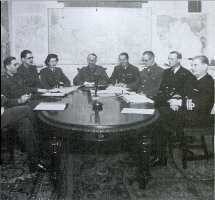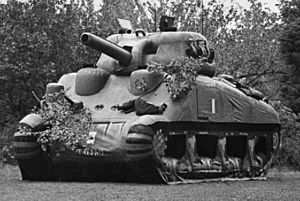London Controlling Section facts for kids
The London Controlling Section (LCS) was a secret British department created in September 1941 during World War II. Its main job was to plan and coordinate all the Allied forces' strategic military deception efforts. This meant making the enemy believe things that weren't true, or hiding what was really happening. The LCS was part of the Joint Planning Staff in the War Cabinet offices, led by Prime Minister Winston Churchill.
At first, the department found it hard to make a real difference. Its first leader, Oliver Stanley, was also away often because his wife was very ill. In June 1942, Colonel John Bevan took over as the Controlling Officer and led the LCS until the war ended. The work of this secret group was finally made public in 1969 by Sir Ronald Wingate.
Contents
The Start of Deception
As World War II began, the Allied nations started to see that deception could be a powerful tool. In early 1941, a group called 'A' Force, led by Lieutenant-Colonel Dudley Clarke in Cairo, began carrying out deception operations for the North African campaign. Their success caught the attention of high-ranking military leaders. Clarke was called to London in September 1941 to explain his work.
The War Office was impressed by Clarke's ideas. They suggested that a similar department should be set up in London to manage deception across all war zones. Clarke was offered the job of leading this new section, which was named the London Controlling Section. However, he chose to go back to Cairo.
Instead, on October 9, Colonel Oliver Stanley, a former Secretary of State for War, became the head. Clarke had left very little information about his 'A' Force, so Stanley had to figure things out on his own. Strategic deception was a brand new idea in England, and not many military leaders were interested in it. The LCS had representatives from the army, navy, and air force, but they didn't have much power at first. The RAF even sent an author, Dennis Wheatley, as their representative instead of a high-ranking officer. This lack of interest made the LCS feel "almost powerless," according to Wheatley. There weren't many offensive operations being planned on the Western Front, so Stanley couldn't do much to raise the department's importance. However, the LCS did manage to create Operation Hardboiled, a fake threat against Norway, but it didn't lead to much.
The failure of Hardboiled was very disappointing. To make things worse, Stanley's wife was diagnosed with a serious illness, and he took a lot of time off to care for her. In May 1942, Lieutenant-Colonel John Bevan was chosen to join the LCS. Around the same time, Winston Churchill received a letter from Archibald Wavell, a commander who had supported Clarke's deception work in Cairo. This letter seemed to make Churchill more interested in deception. When Bevan arrived at the department on June 1, he was quickly promoted to Controlling Officer, as Stanley had already asked to return to politics.
Leading Deception in 1942
John Bevan was a very determined person with good connections among important people. He quickly understood how important the London Controlling Section could be for Allied strategy. Bevan kept Wheatley, who was also well-connected, on his team, and they worked well together. He also recruited Major Ronald Wingate.
To be taken more seriously, the London Controlling Section was moved into the Cabinet War Office. This put them closer to other key war planners and helped them become an important part of the war effort.
What Deception Means
The LCS was given broad powers to create and coordinate deception plans all over the world. They could even get involved in any matter that would give the military an advantage.
Deception aims to make an enemy believe something specific, which then influences their actions. For example, "cover" makes the enemy think something true is false. "Deception" makes them believe something false is true. Cover stops the enemy from acting, while deception makes them act in a certain way. The enemy doesn't have to fully believe the fake information. They just need to be worried enough to prepare for it.
The main target of deception is the enemy commander, and the information is given to their intelligence team. For example, in Europe, the goal was to deceive Adolf Hitler himself through his Supreme Command of the Armed Forces (OKW). The information was passed to a part of the German Army's intelligence staff (FHW).
Three key parts of a successful deception are: a clear plan, good security, and enough time. There must be a clear idea of the real situation, what the goal is, and how to make the enemy believe the fake story. If security fails and the enemy knows the truth, there can be no deception. Also, the more important the target, the more time is needed to build up the fake information.
John Bevan added two more important parts to strategic deception: codebreaking and double agents. Codebreaking in Europe was done at Bletchley Park, and the secret information they found was called Ultra. This information helped the Allies understand what the enemy planned. It also helped them see if their own deception operations were working.
Double agents were spies who pretended to work for Germany but were actually working for the Allies. They were managed by the "Twenty Committee." Double agents gathered information about what the Germans were interested in through questions they received from their German handlers. More importantly, they were used to give false information to the Germans at a high level. British intelligence was in a very strong position because they had broken German spy codes early on. This meant they could read messages between German spy headquarters and their agents. This allowed the Allies to know if and when their deception attempts were believed. German intelligence, on the other hand, had no way to know if their deceptions were effective.
Key People in the LCS
The LCS had seven main members, not including those who were temporarily assigned:
- Lieutenant-Colonel (later Colonel) John Bevan, the main leader.
- Major (later Colonel) Ronald Evelyn Leslie Wingate, the second-in-command.
- Flight Lieutenant (later Wing Commander) Dennis Wheatley, a well-known author.
- Major (later Lieutenant-Colonel) Harold Peteval.
- Commander James Gordon Arbuthnott, from the Navy.
- Major Neil Gordon Clark.
- Major Derrick Morley.
One American officer, Major (later Lieutenant Colonel) William H. Baumer, also worked with the LCS for Operation Fortitude and other operations.
As the head of the LCS, John Bevan was one of the four most important deception planners in World War II. He was helped by his friendships with powerful figures like General Lord Ismay, who was Churchill's Chief of Staff, and Sir Alan Brooke, the head of the British Army. Bevan even dined with Brooke several times a month. Bevan also had direct contact with Churchill and indirect contact through Ismay.
Wingate, the second-in-command, joined the LCS thanks to Ismay, as they had worked together for a long time in India. The LCS had a lot of influence with Churchill because he was very interested in deception.
Dennis Wheatley, who was in his forties, was a very popular and best-selling author. Even though he was initially a lower-ranking officer, he often used his fame and writing skills to deal with high-ranking officers. Several of his creative ideas were used, including the plan to trick the Germans about where the D-day landings would happen. His writing skills were also very useful for writing the deception plans.
Major Operations
The first big deception operation by the London Controlling Section was for Operation Torch. This was the Allied invasion of French North Africa on November 8, 1942. The deception plans for this operation included Operation Overthrow, SOLO I, SOLO II, Operation Townsman, and Operation Kennecott.
The most important operation the LCS was involved with was Operation Fortitude. This was the cover and deception plan for the Normandy invasion in 1944. The overall plan for Allied deception in 1944, called Operation Bodyguard, was created by the LCS. This plan set out the main story for Fortitude. However, Fortitude itself was carried out by the "Ops (B)" section of SHAEF, under General Eisenhower. Ops (B) had two parts: one for physical deception (like fake tanks) and another for "Special Means," which meant controlled leaks of false information.
After the War
John Bevan left the LCS in mid-1945. The LCS continued into the Cold War period, but its size and makeup changed a lot.
 | Georgia Louise Harris Brown |
 | Julian Abele |
 | Norma Merrick Sklarek |
 | William Sidney Pittman |



